This piece contains FULL spoilers for The Last Jedi
It’s been a week since The Last Jedi came out. There are petitions on Change.org to have it stricken from canon and to have Rian Johnson issue a formal apology for it. The Rotten Tomatoes differential between the critic and audience score is a mind-boggling 38 points. Fandom dialogue, even for this one, is at its most heightened state yet. And I don’t understand a word of it.
I sat in the theaters on Saturday morning with my breakfast popcorn and a huge smile on my face. This was a perfect movie. The character arcs were tight and meaningful, the setup was perfectly logical and focused, the force mythos was expanded upon, and the themes toyed with were thoughtful and uplifting. This was exactly what I wanted in a Star Wars film, and I couldn’t wait to revel in that excitement with everyone else.
Only it wasn’t there.
Now, I want to say right here that I’m not taking aim at all criticisms. For instance, as a white woman, I lack the background and experience where, say, the imagery of Finn being tazed would be viscerally upsetting. There’s a fair bit of discomfort being expressed at the treatment of POC in the film—from feeling like Finn and Poe were sidelined, to Rose/Finn dipping into tokenism territory, to Poe’s writing being stereotypical and formulaic. These are unfortunate implications, whatever Johnson’s intentions, and it’s important that we leverage voices of marginalized viewers so that this kind of stuff gets addressed. Or at the least, so Abrams feels a bit more compelled to have a diverse writers’ room with Episode IX.
It’s also not like there’s only some valid criticisms. At the end of the day, there’s no accounting for taste; if people felt the writing was bad, the characterizations were poor, or the story was uncompelling, then that’s the way of it. It’s just that when those are the types of complaints, I can usually at least understand where it’s coming from. Legend of Korra is a perfect show to me, but I know it’s also a hot mess and I get why people pan on it.
So I did what I always do; I tried to dig into these complaints and really come out on the other side of hearing it. I guess Luke’s scripting could be seen as sitting in contention with his attitude in Return of the Jedi. (Even if to me, his success in “redeeming” Vader set UP these events, and if he saw the horrible pain and suffering at the hand of Ben that was basically inevitable in his mind, then his instinct wasn’t exactly unreasonable, especially since it also meant the protection of his other students.) I guess Finn and Rose’s subplot technically wasn’t necessary. (Even if it was the thematic center of the entire movie.) I guess we needed more answers as about the politics behind the First Order and who Snoke was. (Even if these were problems Abrams introduced with The Force Awakens, and it’s simply not the focal point of this story, just like Palpatine’s backstory hadn’t been in the original trilogy.)
I just couldn’t do it! I can’t even write a paragraph out explaining the complaints without adding my own justifications. And to make matters worse, the longer I’ve thought about this movie, the deeper it gets, and the more I like it.
I have no clue what these “twists” are that people keep referring to; there was a deconstruction of standard Star Wars storytelling conventions, but everything was born from the characters, and it came together with a message that was complete in-line with the originals. I understand not connecting with Rose the way I did, or wishing Luke had been more optimistic, or wanting Kylo and Rey’s dynamic to be painted in a different light, truly. But the virulent hatred is not something I understand at all.
Until it hit me: I’ve seen this before. A piece of hotly-anticipated media that subverted expectations and broke down the core of the story being told? That forced the audience to pull back and consider foundations, while focusing on character arcs that parallel and complement each other with remarkable cohesion? A story that the more you think about, the more there is?
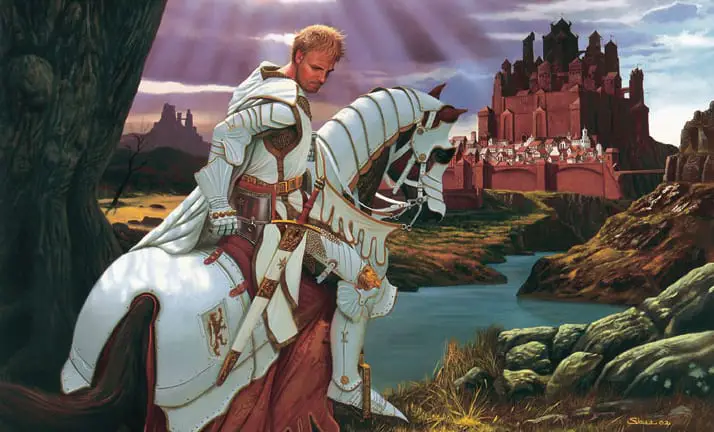
Yeah, that’s A Feast for Crows from George R.R. Martin’s A Song of Ice and Fire series. You know, the “boring book” in the series that is usually cited as the worst one, again, to the confusion of me.
Now look: I don’t want to pretend Abrams or Johnson are even half the worldbuilders that Martin is. I also don’t want to pretend there aren’t flaws in Martin’s writing, or that The Last Jedi couldn’t have done with tweaks. But I do think the strong reaction against the newest Star Wars film bears a striking similarity to Feast’s polarized reception as well, and for many more reasons than the fact that there is a polarized reception in the first place. So let’s dig into Johnson’s work.
Focus on Themes over Plot
I’ll be honest here—the talk about all the “plot holes” in The Last Jedi really confused me. There was a bit of an inconsistent timeline (nowhere near the full-blown wonkiness of Empire Strikes Back), but otherwise we were looking at a bottle episode. The Resistance was on the run from the First Order. There were specific logistics with their ships that prevented them from escaping. To escape, they had to disable the First Order’s tracking. This went poorly, so they took a Plan B (or C or D maybe) and made to hide on a planet.
The worst that can be said about this movie’s plot was that it’s not incredibly interesting, though in my opinion, these types of movies are when characters are able to shine. Kind of like how they did in Empire, with the main plot being “Leia and Han crash on a friend’s couch.”
No, the creative energy was not spent solving J.J. Abrams’s annoying mystery box for him. It was spent instead on delivering us one of the most thematically packed Star Wars movies to date.
Some bash you over the head. “Failure is the best teacher.” Yes, there’s a lot of failure in this movie. Finn and Rose’s “heist” doesn’t work, Poe’s mission to take down the dreadnaught leaves the Resistance exposed, Holdo’s transport strategy was found out, and oh yeah…Luke couldn’t save his nephew, or the entire concept of the Jedi Order.
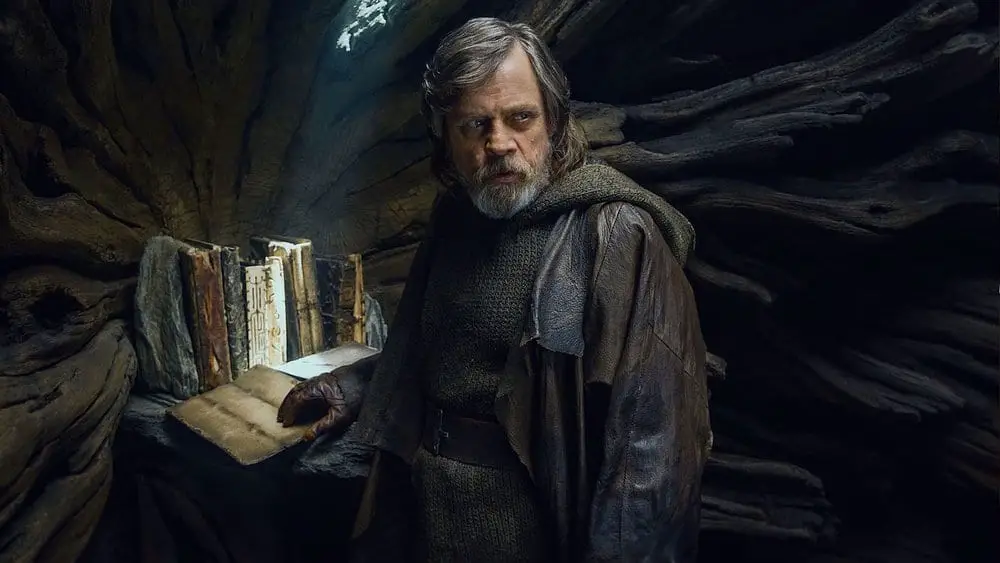
Interestingly, I’d argue that Rey doesn’t exactly fail, unless you consider it her role to redeem Kylo. I suspect many do (let’s not), and that is ironically everything Kylo’s scripting takes a shot at, given that he’s a not-at-all-subtle embodiment of white, male entitlement.
It is likely for this reason that the movie also hammers home the idea that it’s our choices and actions that have consequences, regardless of intent. Luke’s internalized guilt over “failing” Ben was part of this; it didn’t matter why he ignited his lightsaber, but he did that thing and it brought everything down. Poe and Finn both learned that good intentions can result in people getting hurt, though from opposite angles. Even Kylo’s “kill the past” drives home the idea that he’s sticking to his choices.
We’ve also got the good ol’ balancing of the personal and political, which is a particular favorite of George R.R. Martin’s. Finn’s focus went from being entirely about protecting Rey, to seeing the systemic injustice and willingly putting himself in front of the barrel of that gun, only for Rose to show him the balanced path, as Gretchen pointed out in her review of Cobalt Squadron—fight for those you love, and inherently consider yourself. Poe’s arc handled the topic in a similar way, though he had started out all guns blazing against the First Order, without a focus on the individuals. Holdo’s course of action was more “do what you can to fight another day,” but she ultimately threw herself into the fight to allow others that opportunity. Luke had to grapple with the personal grief within his family to show Rey a path.
And Rey, our main protagonist, was in the center of all of this, struggling to understand who she was and her origins to find some place in all of this.
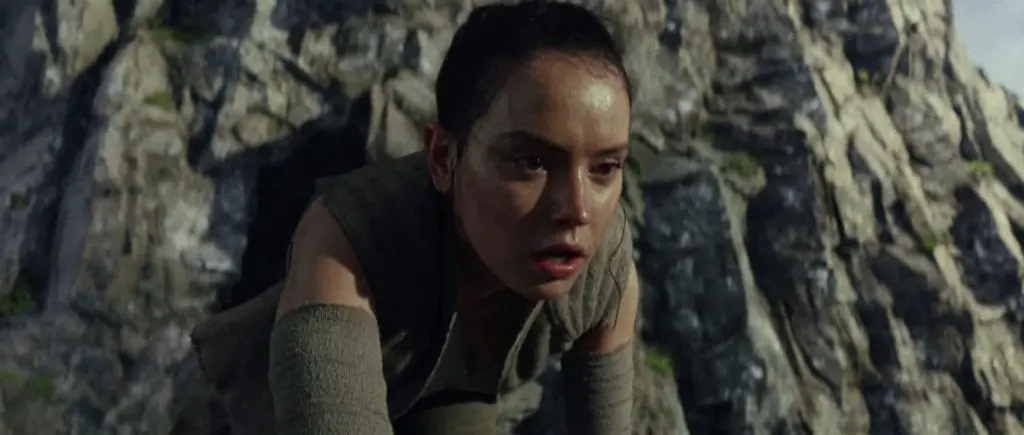
Parallels on top of Parallels on top of Foils
I actually have to stop myself here from getting too deep in discussing the themes, because they are so intimately and thoroughly linked to character journeys and overall messaging that I’m more or less in danger of upstreaming my own points.
Like A Feast for Crows, most of The Last Jedi deals with identity. This is most explicitly Rey’s journey, since she literally stumbles into a vision centered around that question, but it is present in every facet of this movie. And like A Feast for Crows, she is hardly alone in this.
Poe and Finn are the Jaime and Brienne of the tale in terms of how closely they mirror one another. It’s true that neither could be considered to have a slow-paced travelogue; as described above, they came from opposite angles of how to view the Resistance and their place in it, ultimately to settle into a point of balance that took the big picture in mind, over their impulses. Finn, being a former stormtrooper still coming out of conditioning, has an opening mentality that feels better-seeded than Poe’s. However, I do struggle with claims of Poe being “out of character” when the man was more or less a complete MacGuffin in The Force Awakens. And in the case of the narrative, it is the whole and not the sum of the parts where the takeaway can be found.
This is where Rose steps in. Her line, “We’re going to win this war not by fighting what we hate, but saving what we love!”, is the moral center of The Last Jedi, and really the original trilogy, when you think about it. However, Rose is not merely a font of thematic wisdom; she has her own arc that solidifies this. We’re shown how she feels about Canto Bight. How her own deeply felt sense of loss—raw from her sister’s death—makes her want to “put her fist through this beautiful city.”
The fathier race through the city does cause damage, and we see her enjoying it, but the moment she cites as making their (failed) excursion worthwhile was when she freed the fathier she and Finn rode. It’s about empathy and love, not fleeting revenge (however justified), which both Finn and Poe fell into. DJ is the one who allows Rose to put it into words in the end, since he breaks down the illusion of “sides” being the all important dialectic.
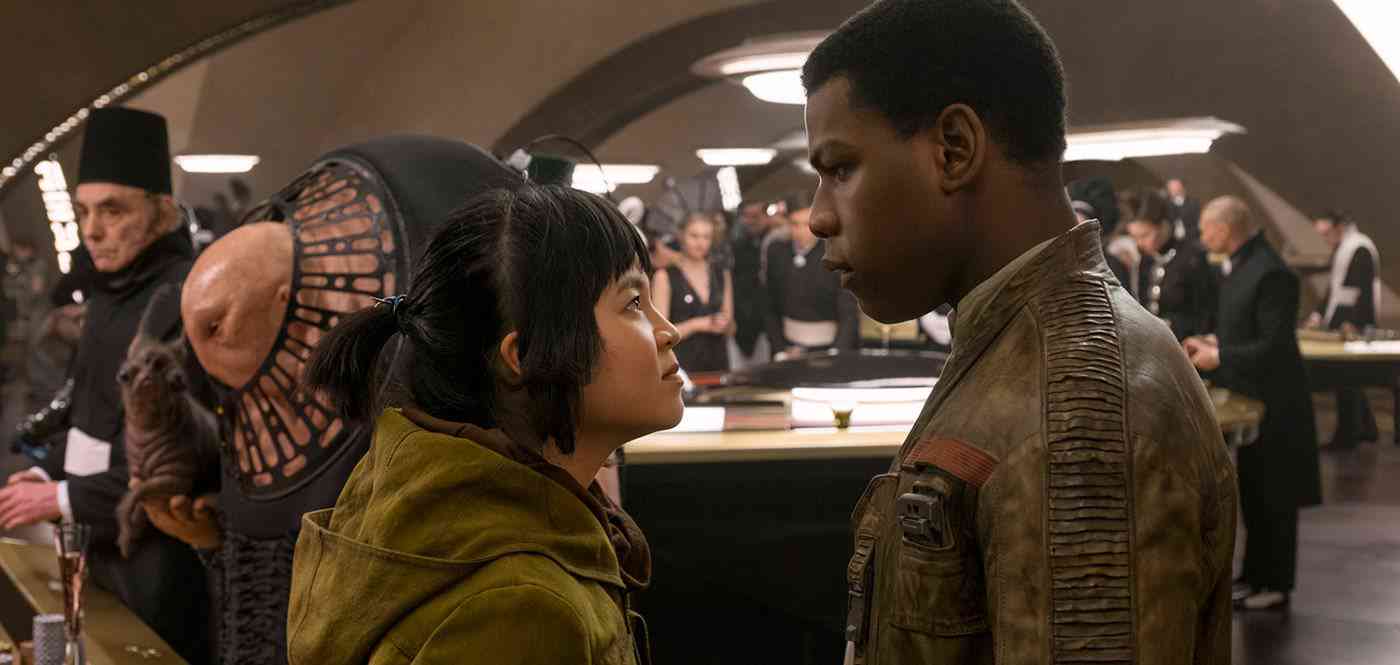
All of this, of course, is exactly what Rey and Luke grapple with. Luke fears her going “straight to the dark” when she first reaches out with the force, but yet the absolutes he held dear quite literally went up in flames. Rey, meanwhile, embraces the darkness as a quest for answers, yet stays committed to an empathetic course of action. That’s the goodness. That’s the only “side” worth fighting for. It’s the side that makes her believe Ben could turn away from the pain and destruction he’s caused, and the same side that makes her immediately rebuke him when it’s clear that he’s still committed to it. Luke sees that this new path Rey carves out is the one of the future, and ultimately sacrifices himself to see that through, saving his sister in the process.
Holdo is seemingly the odd-man-out in this tale, but she parallels Rose and Leia and Rey in finding that middle balance between intention and action. At the same time, she, Leia, and Luke all redefined what success was for the Resistance and adapted to the new situations. Yeah, they were so badly beaten that they all fit on the Millennium Falcon; but hope, centered around caring and balance, lived on. And it loops back to Canto Bight, where the poorly treated stable boy, inspired by Finn and Rose, has that same drive for justice and same commitment to empathy that keeps the resistance alive, no matter how many die. Oh and he also has force powers.
(As a side note, this is why I have extreme confusion about people who consider The Last Jedi to be depressing in its message, just as I believe there’s a romanticism and faith in humanity underlying A Feast for Crows.)
The only person you could say doesn’t have a character arc is DJ, but he is most decidedly a character to frame this message, in the same way the Elder Brother frames Brienne’s journey. Simply put: in a Martin-esque novelization, he’s not a PoV character. Neither are Hux, Snoke, Phasma, BB-8, or Billie Lourd (was she named yet?).
Kylo Ren is though, and to equate him to Cersei Lannister would frankly be an insult to her character. However, there’s one commonalty they share: they are foils to literally everyone.
See that’s the thing: Kylo Ren is our antagonist. I’m firmly of the belief that this story should not head towards a redemption for him, which I’ll elaborate on a bit more below. But he’s a brilliant antagonist for the precise reason that he is a foil. There’s the obvious way in which he acts out of revenge over compassion. He’s also the “opposite” of Rey in terms of background and view of his role in this narrative. He tells Rey she has no place in it, while he is the one who claimed to be entitled to Luke’s lightsaber in The Force Awakens, for instance.

All failure on the part of the characters in this resulted in a readjustment or reframing of the issue…except for Kylo, who doubled down. He learned Snoke had been pulling strings to make him believe he could “turn” Rey, but after cutting down Snoke, merely took his place. Shockingly, Rey was less than wooed.
The Last Jedi’s tension was really just every character defining who they were to themselves and what their place was in this. Seriously, every character. Kylo chose who that was for him, and of course in true poetic justice, his desire to free himself of the past (double parental issues!) more or less guaranteed it would always haunt him and likely lead to his downfall. “See you around, kid.”
He’s a self-made villain in a Cersei-ish way, and as the audience we are invited to understand what that battle within him looked like. It’s just that unlike Cersei, he’s also the embodiment of entitlement. Luke is too, on a narrative and meta-textual level. But Luke’s arc had that readjustment; he changed with the times and redefined the Jedi Order, as well as his own narrative participation, by what was now needed.
Women Take the Reins
This movie is just…very relevant to our times. And apparently Rian Johnson got the memo that “the future is female,” though without the usual Hollywood infantilization that accompanies it. Or perhaps, “a woman’s place is in the Resistance” is more on the nose.
Commodification of political activism notwithstanding, The Last Jedi had absolutely no chill about women driving not only the plot, but the solutions.
Rey’s approach to being mentored by Luke was more or less her going, “That’s interesting, but I’m not going to listen to you at all because you have weird absolutist views on this stuff as a result of your own baggage.” Rose saved Finn with the decided message of “you matter,” because she had been able to redefine what success and justice looked like for her. Leia literally stun-gunned Poe and yelled at him until he got a similar message, which was validated by Holdo’s sacrifice. (This is not doing anything to prevent me from running away with Leia/Poe headcanons, I should note.)
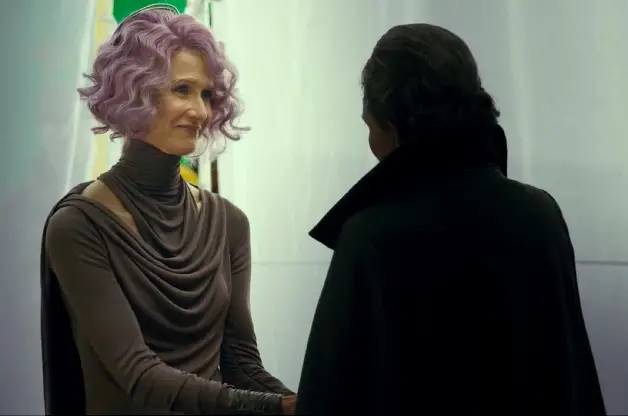
Perhaps the best bit is Rey’s own refusal to engage with Kylo. She was primed to take Luke’s place as the one to drive a redemption, only to realize that it wasn’t her burden or role, and that if he was going to choose to be an asshole, then she was going to quite literally shut the door in his face to any further interaction. His “you don’t matter except to me” attitude was fully rejected. She knew she had a place in it, one that she chose and earned, and that will become her story.
I don’t want to belabor this point, especially since it bleeds into the next one. Also it’s been rather obvious from the get-go that Rey is our central figure in the trilogy. I suspect some of the push-back may be due to this fact, in the same way it’s hard for me to ignore that 57% of the chapters A Feast for Crows are a female PoV.
However, while that might be a shade to dialogue about both pieces of media, I believe it’s more a case of…
Deconstruction of the Rules of the Universe and Subverted Genre Expectations
We’ve discussed before how A Feast for Crows sort of switched genres on the reader. Granted, the A Song of Ice and Fire series is all about a subversion of genre expectations. But the fourth book was also the one where we were forced to sit with the fundamental nature of fantasy stories and truly crack into what it meant. As I wrote:
“Through broken characters and a broken landscape, Martin was able to hold a light up to the inherently unsustainable nature of the feudal order. Violence wasn’t worshipped, and pacifism was often far more daring.” —AFFC is the Best of ASOIAF and I’m That Person
This was always the case in A Song of Ice and Fire, though the lens was not held up explicitly until the “action-packed” first chapter (the War of Five Kings) concluded. Here, book readers were not able to escape the fact that this series—which could easily be read as awesome twists and messed up moments in a quasi-medieval setting—was created to take aim at all of those moments. Or, they did escape it by focusing on the lack of action, instead of what was now filling the page.
(Despite what it might seem like, I’m not judging anyone with this reaction; I too found Feast dull on my first read through, and didn’t really “get” it, or really the series, until my reread.)
I suspect strongly that opinions on The Last Jedi will warm with multiple viewings. Because it did break the paradigm of this franchise. Kylo Ren won’t be redeemed (or, if he is, it will sit in contention with everything this movie introduced, and the new trilogy will end up being the most fascinating game of tug-of-war between Rian Johnson and J.J. Abrams). Skywalkers aren’t the center of this story, and nobodies earn their place as the heroes through actions. Yoda lights the old ways of the Jedi Order on fire, and tells Luke to get over it because times change. Luke chucks his lightsaber over his shoulder and refuses to take part as the mentor.
On a Doylist-level, the two white men hand off the narrative. Luke does so willingly and sacrificially, while Kylo takes himself out of the running as a hero. This is a story that belongs to women and POC, our decided heroes, with an East Asian woman explicating the thematic core to the audience.
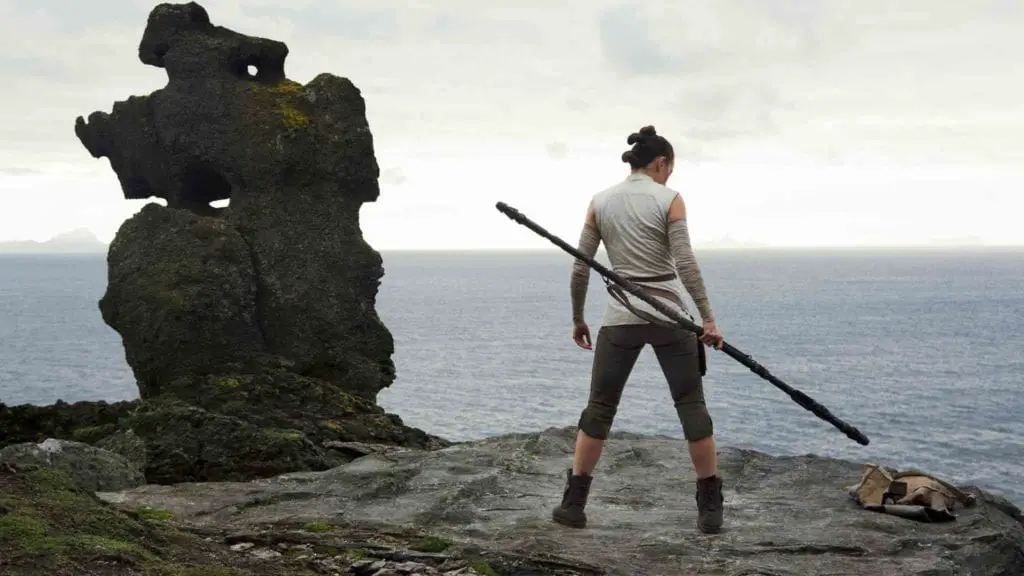
“It’s Star Wars! It’s about how nobody is a lost cause and anybody can be redeemed!” Is that the case? Because as Gretchen so eloquently stated to me, redemption as a foregone conclusion can’t actually be a redemption. Star Wars has really been about giving people the opportunity to change, and Rey did that here. Hell, she assumed the same thing as Star Wars fans; the Skywalker gets redeemed. It was going to be like poetry and rhyme.
So yes, it was a rug pulled out from under the feet of some viewers. But it really isn’t counter to Star Wars ethos. Instead, it was a deconstruction of what this really means, and a bit of a spiritual successor, like Legend of Korra was to Avatar: The Last Airbender. Once again, it was Gretchen who put into words exactly what was discovered: “hope is communal, not individual.” Yup, that’s the core of this franchise.
Maybe I’m incredibly wrong about where Kylo is headed. It is clear, however, that The Last Jedi took aim at the Skywalker legacy with an assertion that this story didn’t belong to them. Rey had a place in it, whatever Kylo told her about her parents. The fact that they’re morally bankrupt nobodies? Even better. It also took an even stronger aim at the “chosen one” trope. Yeah, that was what the original trilogy was structured around. But was it necessary?
If anything, Luke’s headspace and guilt shows the damaging results of buying into it. He was “Luke Skywalker,” so of course he was going to restore the Jedi and be the perfect instructor. His success in Vader’s redemption juxtaposed with his failure to save Ben sets up his alienation. And the fact that he finds hope not in perfectly correcting mistakes, but in learning from them, growing, and adjusting? That’s the point.
The world doesn’t need Luke Skywalker, because there can’t be a chosen one with that burden on them. It’s not sustainable or healthy. Instead, the world needs those who will fight for justice when the time comes, and who place empathy in the center of their morality.
The now-stricken EU had historically painted Luke in a different light, as more of a classic action hero. But that was never him. He was always a bit of a trope-buster, and the absolute perfect person through whom the paradigm could be deconstructed. Just like Rey, the nobody from nowhere who hadn’t wanted to leave for an adventure at all, became the perfect person to embody the change.
Everything you just said is wrong.
If you didn’t like The Last Jedi, try rewatching it. You still might not enjoy it, or you might see better potential in other directions. That’s perfectly fine. But I highly encourage trying to engage with its thematic core. I promise, that extraneous Canto Bight theater is suddenly going to start looking very relevant.

